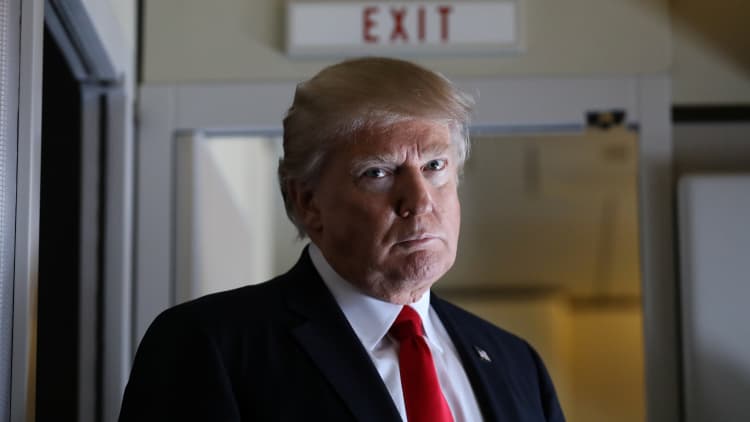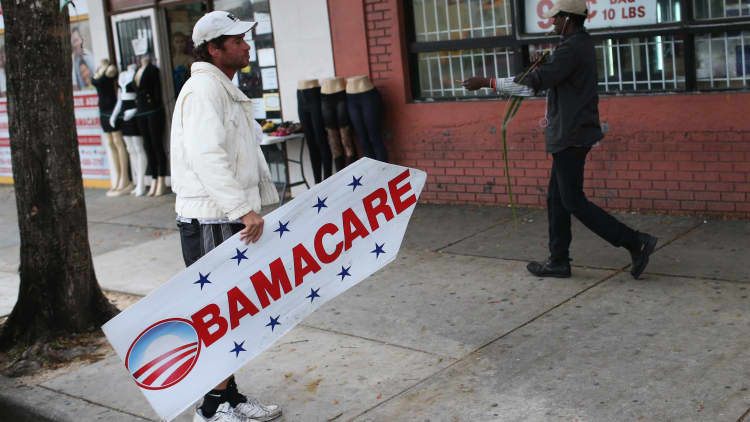The man who until last week headed the federal Obamacare marketplace said the Trump administration killed advertising and outreach for that exchange intentionally "to suppress enrollment" in Obamacare plans.
Former HealthCare.gov CEO Kevin Counihan also told CNBC that the abrupt move by the Trump administration on Thursday could depress sign-ups on that exchange by several hundred thousand people below what would otherwise be expected in the final week of open enrollment, which ends next Tuesday.
And Counihan said Friday that many of those lost enrollments will be from young adults who are much sought after by insurers because their healthy status and premium payments help offset the cost of benefits paid toward older, sicker adults. Without that "good risk" from those customers, insurance plans could face further pressure to raise their premiums next year.
Counihan noted that sign-ups on Obamacare exchanges spike sharply in the week before enrollment deadlines, particularly among young adults, and that the last 48 hours or so see the biggest volume of sign-ups.

"The insurance companies, by the way, were counting on this [surge from young adults], we've had specific discussions with them," he said.
"It's counterproductive," Counihan said of the White House's decision to end scheduled ads, outreach and reminder emails to encourage people to beat Tuesday's deadline and sign up for coverage on HealthCare.gov, which sells plans in 39 states.
"To be frank, I think it's fairly transparent," Counihan said when asked why the White House pulled the plug on that outreach.
"I think the intention is to suppress enrollment," he said. "This has a material impact on enrollment."
"It feels to me that what they're doing is reacting to the fact that there is growth in enrollment," Counihan said of the Trump administration.
A spokeswoman for the the industry group America's Health Insurance Plans, in response to the ads being killed, said, "At a time when the individual market faces challenges,we need as many people as possible to participate — so that costs go down for for everyone."
"Balancing out the risk pool is an important action that can betaken now to help stabilize the market, improve affordability, and send strong signals as health plans develop their products for 2018," said the AHIP spokeswoman, Kristine Grow.
President Donald Trump is a staunch Obamacare foe, calling the program a "disaster" in a speech in Philadelphia on Thursday. Trump has called for the Affordable Care Act to be quickly repealed by Congress and replaced with a better plan, but so far has not unveiled the details of that plan.
HealthCare.gov and the other Obamacare exchanges run by individual states and the District of Columbia so far this enrollment season had signed up more than 11.6 million customers, putting them on track to beat last year's enrollment tally somewhat, before Thursday's move by the White House. HealthCare.gov alone accounted for about 8.8 million of the tally to date.
Counihan and others have pointed to the healthy pace of sign-ups as proof that Obamacare is not failing, much less in a "death spiral" that results when not enough healthy customers are in insurers' risk pool, leading to higher premium rates.
"The problem here is this is literally yanking, like a minute before midnight," messages that could bolster sign-ups and improve that risk pool, Counihan said. But he added that Obamacare advocates, including navigators who help people enroll in individual health plans, are "doubling down on outreach" because of the White House's decision.

Counihan on Thursday night issued a scathing statement on the decision, calling the move "outrageous" and saying it would "sabotage" open enrollment in Obamacare plans.
"I was sad and disappointed," Counihan told CNBC on Friday. "I was sad because it doesn't feel like this is the way to make policy."
Other former Obama administration health officials took to Twitter to express their dismay, and shared HealthCare.gov ads that remain on YouTube.
Counihan noted that the the requirement under the Affordable Care Act that most Americans have some sort of health coverage or pay a tax penalty remains in effect.
And he said that HealthCare.gov and the other Obamacare exchanges run by individual states and the District of Columbia have done a good job of expanding insurance coverage in the United States, partly among lower- and middle-income families who qualify for subsidies that reduce the cost of their monthly plan premiums.
"I find it kind of curious" that the White House has ended the ads, because "the Trump administration has gone out of its way to position itself as an advocate for the common man," Counihan said.
"This program, the ACA, is completely designed for the common man." Counihan said, adding that the "majority of individuals" signed up on the exchange earn less than $35,000 annually. "it feels, in some respect, a little ironic."
The U.S. Health and Human Services Department has not responded to CNBC about why it ended ads and outreach for HealthCare.gov.
But HHS, which operates that Obamacare exchange, told Politico, which first broke the news of the decision, that "the federal government has spent more than $60 million promoting the open enrollment period ... HHS has pulled back roughly $5 million of the final placement in an effort to look for efficiencies, where they exist."
But Counihan on Friday said he doesn't believe that HHS could save much, if any, money from the move because the ads were already paid for. The Obama administration paid for and scheduled the ads and outreach through next Tuesday — meaning they were running after Trump was sworn in as president on Jan. 20.
When he ran HealthCare.gov, Counihan and other Obama administration health officials tweaked outreach strategy to maximize the impact from ads and other methods used to spur enrollment, particularly by young adults. Recently, that strategy has included multiple email reminders to people who created an account on HealthCare.gov, but who stopped short of signing up for a health plan sold on that exchange.


